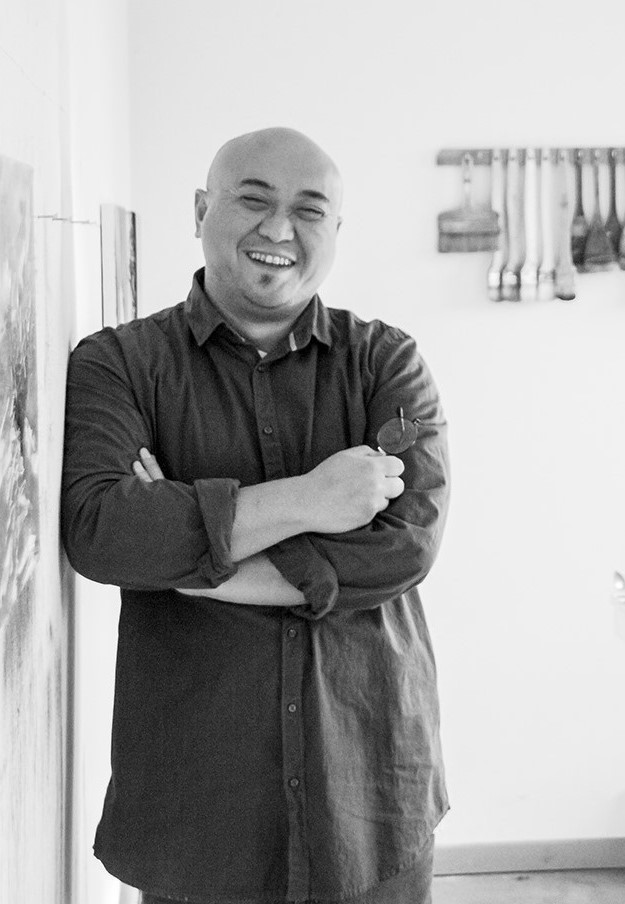Jin Bô

Sometimes the day returns. Like a winter afternoon, gleams filter through the fog. You stand in the center of the canvas, and the evidence of the water envelops you. Jin Bo's painting is reminiscent of a lacustrine moment, in half-erased frames, a pontoon devoured by mist. Do not be surprised to hear voices through these gray and bluish monochromes. Time is like that. It combines with the place, it permeates the landscape and those who inhabit it. Alive or ghosts, it doesn't matter. Jin BO's canvases cross eras, contemporary or abolished. Sometimes children play in the water, they laugh, they splash. A train passes behind the curtain of trees. The painter remembers. From him, from us, from northern China, and other places that no longer have a name.
"I don't have a very good memory," he said. Some things started to fade. To tell the truth, my paintings today are also like an image album.” This is how it is with life, like the places in which it took place. Landscapes are no exception to this progressive amnesia. In a series called “Metamorphosis”, he already painted in 2005, this transformation of the face and gestures, taken aback, tormented by doubt, in a cry, in a grimace that takes shape. Humans are like cities caught in the cold. “I grew up in northern China and more specifically in Tianjin. The winters are very cold there, the light too. For the rest, everything has really changed. The past no longer exists and modernity... I don't understand this modernity.”
Basically, it is better to stay in the fading of the canvas and maintain the discussion with what was. Melancholy, like his last series, entitled “Isolated Island” (2017-2020), which still speaks a dormant, half-extinct language. Words of light, words of darkness to express our human indecision, our doubts, our absences.
At the end of the 80s, Jin Bo was barely 11 years old, and he was discovering Western painting. These are years of construction, he suggests, where “(je) découvre la Renaissance italienne, et cetthe strangeness of reality which (to me) seemed to come out of a dream.” People's China did not hold the same benchmarks. The child is initiated, becomes familiar with different colors, then he discovers a little later impressionism, abstraction and the conceptual. “At that time, I moved away from books, and from exhibitions too, because I wanted to stay with my painting and help it to build itself, without influence.” His arrival in France did not change anything. It's been that way for fifteen years. It is no coincidence that his latest series takes this solitary name.
Day after day, painting is therefore limited to the essentials. On the canvas, only feeling remains, the fluctuation of doubt, in short, a humanity which is the link, the true light of the work. No doubt his coming to the “Porte Grenade” is part of the explanation. Sharing light is a common feeling, which the Toulouse workshop maintains in its collaborations. “I think about what Kossi's lighting can bring to my work. An illuminated canvas can still be read in a different way”, suggère alors le peintre.
It would therefore be a possible relationship between the painting and the future luminous object. The lighting would come from within. In fact, Jin Bo's work already works that way. The inner landscape exudes a landscape-like clarity. It is a feeling that it is, a founding memory or a desired reminiscence. Kossi's light follows an identical path. It goes into the depth of the painting and partly reveals the intimacy of the place. In short, what we have left of humanity.
Roger Calmé (ZO mag’)